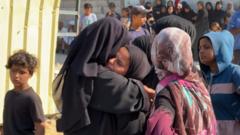Israel's response to the mounting international pressure regarding starvation in Gaza includes new humanitarian measures, but skepticism remains about their effectiveness.
Israel's Humanitarian Measures: A Response to International Scrutiny Amid Gaza Crisis

Israel's Humanitarian Measures: A Response to International Scrutiny Amid Gaza Crisis
Israel announces aid initiatives amid global outrage over humanitarian crisis in Gaza.
Israel has recently unveiled a series of humanitarian measures aimed at countering the intense global condemnation over the ongoing starvation crisis in Gaza. The Israeli Defence Forces (IDF) claim these steps will enhance the humanitarian response, allowing for aid airdrops—an initiative that commenced with Israel itself dropping supplies in the night, followed by assistance from the United Arab Emirates air force.
In tandem with these efforts, Israel has outlined plans for a "tactical pause in military operations" in specific zones and established "designated humanitarian corridors" intended to counter assertions of deliberate starvation directed at Gazans. However, this announcement has been met with skepticism; Hamas has denounced these moves as mere "deception," accusing Israel of attempting to improve its global image amid worsening conditions.
Despite ongoing Israeli claims that it is not responsible for Gaza’s humanitarian crisis, this narrative is disputed by several close allies and international organizations. The recent joint statement from Britain, France, and Germany underscored calls for Israel to lift restrictions on aid and permit UN agencies to operate without hindrance, emphasizing Israel's obligations under international humanitarian law.
Previously, Israel had enforced a total blockade on aid, followed by numerous limitations on what could enter the region. A new framework—established in collaboration with the U.S.—aims to funnel humanitarian support through the Gaza Humanitarian Foundation (GHF), which Israel claims was needed due to Hamas's alleged misuse of UN aid. Nevertheless, the UN has raised concerns regarding the GHF's credibility and effectiveness, with reports indicating significant civilian casualties amid its operations.
Jonathan Whittall, head of the UN’s Office for the Coordination of Humanitarian Affairs in the Occupied Palestinian Territories, critiqued the GHF's operational methods, calling conditions in Gaza "carnage." He emphasized that without substantial changes in logistics and protections for civilians collecting aid, the situation will continue to worsen.
As the IDF maintains that its actions adhere to international humanitarian law, some Israeli leaders are currently under an arrest warrant issued by the International Criminal Court. These allegations—centered around the war crime of using starvation as a method of warfare and other crimes against humanity—are emphatically denied by Israeli officials.
In a recent display to demonstrate aid distribution efforts, the IDF released footage showing planes dropping aid packages over Gaza. However, experts warn that airdropping aid is often a last resort; it doesn’t compare with organized ground convoys that could deliver far more substantial assistance efficiently.
The humanitarian crisis has escalated sharply due to the ongoing conflict, severely limiting basic provisions for the region's over two million residents—most of whom are now confined to a much smaller area. Reports indicate that many civilians have gone days without food, emphasizing the dire need for sustainable solutions beyond temporary airdrops and tactical pauses in fighting.
As the situation continues to evolve, the effectiveness of new Israeli measures remains to be seen, as humanitarian groups assert that only a comprehensive ceasefire and unrestricted aid access can genuinely alleviate the suffering in Gaza.


















